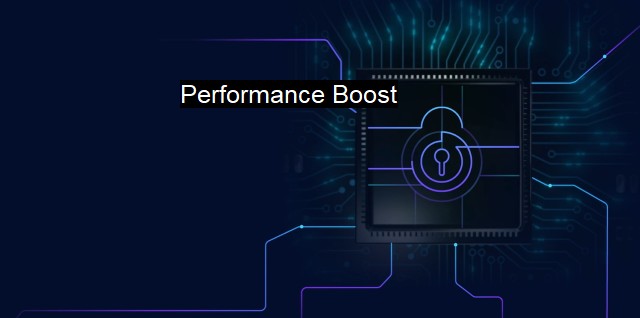What is Performance Boost?
Maximizing Cybersecurity Efficiency: The Role of Performance Boost in Antivirus Software Optimization
Performance boost, within the context of cybersecurity and antivirus software, is a critical function that optimizes the operation of a computer system or network while simultaneously enhancing data protection protocols. Notably, technology advancements and increasing threats from hackers call for actionable protective measures in mitigating risks and optimizing performance. Herein, the performance boost comes into play as an instrumental tool to be deciphered.Performance boost, fundamentally, amplifies the efficiency and overall functionality of a cybersecurity system by enhancing both its speed and proficiency in threat detection and eradication. It achieves this by eliminating redundant processes, optimizing CPU utilization, and enhancing storage capabilities. The right implementation of performance boost doesn't merely curb glaring performance impede but holistically improves system responsiveness.
Cybersecurity threats can significantly obstruct a computer system’s performance, bogging down processing speed and disrupting user activities. Consequently, performance boost features frequently form part of a contemporary antivirus software package, aiming to holistically secure a system by preventing harmful elements from infringing upon a computer's operation and functionality by accelerating the system’s operational efficacy, thereby providing an overall enhanced user experience.
The optimal functioning of an antivirus greatly leans upon the efficiency, speed, and dependability explicitly offered by the performance boost functionality. The software carries out scheduled diagnostic checks, seeks out valid potential risks, and underpins other core operations that demand a constant allocation of computational resources. Without a performance boost to ease these demands, a system may encounter problems with speed and performance consistency, potentially falling short on robust cybersecurity.
The benefits of performance boost extend beyond just augmentation of the system’s virus detection and elimination abilities. Improvement of system boot times, better memory utilization, and keeping system lag at bay contribute significantly to an enhanced user experience. it also aids in battery optimization for laptops and other battery-driven devices by efficiently managing resources, therefore securing longer battery runtimes. It frees up space by discarding unnecessary junk files, thereby enriching system space and potentially extending the lifespan of the system.
Antivirus that employs performance boost provides real-time protection by proactively obstructing potential risks. System operations persevere unencumbered, as the antivirus software tends to operational demand in the backdrop. With improved processing speed facilitated by a performance boost, real-time scanning becomes significantly efficient, improving the system's resistance to malware infiltration. Most antiviruses with performance boost mechanism utilize threat-sensing methods like heuristic detection and behavior-based detection systems that proficiently detect and eliminate even the stealthiest intrusions. The operational swiftness allows for minimal impact on user workflow, hence ensuring non-disruptive security.
The need for a performance boost in the context of cybersecurity does not simply lie in the need to speed up antivirus functions, but in the requirement to provide a dependable, comprehensive security package without compromising system performance. The antivirus industry has reinvented itself to meet these expectations by creating solutions that blend detection abilities and system-level security enhancements with performance boost capabilities. A thoughtful mix of cyber threat technology and performance optimizations poses a reliable shield for systems, paving the way for robust cybersecurity infrastructure. By investing in antivirus software that features a performance boost, one invests in reliable system safety normalized for optimum productivity. Thus, in this ever-progressing digital world fraught with escalating cyber threats, "Performance Boost" found in antivirus becomes an indispensable ally assisting in hassle-free, secure computing.

Performance Boost FAQs
What is a performance boost in terms of cybersecurity and antivirus?
A performance boost in cybersecurity and antivirus refers to the improvement in the speed and efficiency of cybersecurity and antivirus software in detecting and removing threats from a system. It helps to optimize the performance of such software, leading to faster and more effective protection against cyber attacks.What are the benefits of a performance boost in cybersecurity and antivirus?
A performance boost in cybersecurity and antivirus results in faster scanning and detection of potential threats, improved response times, and overall better system performance. This ensures that your device is protected from malware and other cyber threats, allowing you to work smoothly and without interruptions.Can a performance boost improve the lifespan of my device?
Yes, a performance boost can help to improve the lifespan of your device by optimizing its resources and preventing unnecessary strain on its hardware. By ensuring that your antivirus software is working optimally, you reduce the chances of your device getting infected with malware or viruses, which can cause the device to slow down, malfunction, or even crash.How often should I perform a performance boost on my device?
It is recommended to perform a performance boost on your device regularly, ideally once every month, to ensure that it is running smoothly and efficiently. This will help to prevent any potential threats from impacting your device and keep it protected from malware and other cyber threats.| | A | | | B | | | C | | | D | | | E | | | F | | | G | | | H | | | I | | | J | | | K | | | L | | | M | |
| | N | | | O | | | P | | | Q | | | R | | | S | | | T | | | U | | | V | | | W | | | X | | | Y | | | Z | |
| | 1 | | | 2 | | | 3 | | | 4 | | | 7 | | | 8 | | |||||||